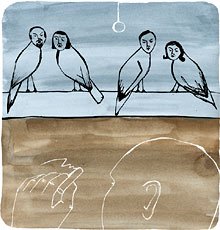Pecking Order: Parent Pressure Is Eclipsing Teacher Control
Parental input is always welcome — but is it always a good thing?

As an educator with more than five years of classroom teaching experience, I -- like so many teachers, parents, and administrators -- have a vested interest in what's best for students in today's public school systems. What I discovered during my recent stint teaching high school English, however, is that students and their parents frequently ignore or, worse, harshly question this interest.
A new, dangerously overdeveloped sense of entitlement among students and parents -- particularly in secondary school -- has led students to actively disrespect teachers on a whole new level. I am talking about behavior that no self-respecting person, let alone an educator, would ever be willing to tolerate. Times have changed, as the kids say, big time.
As for parents, somewhere along the line, they seem to have gotten the implicit or explicit message from administrators that, because they pay taxes for their child to attend public school, they are somehow entitled to unprecedented influence over what their child will learn at that school. Judging by their behavior, parents think they know better than classroom teachers what's best for their kids, going so far as to suggest which books a teacher should or shouldn't teach, and often arguing the relative merits of any given teacher's lesson plans -- not in a spirit of kindness or helpfulness, but as hectoring superiors.
To be fair, there were thirty-nine students in my Honors English class, an unwieldy size at best. Also, most of this group qualified as "highly intelligent," and therefore, as they and their parents obviously believed, "highly entitled" to special treatment within the school system -- something that, as a fair educator, I was unwilling to give.
On Back-to-School Night, every parent of students in my Honors class showed up -- mostly to interrogate me about my syllabus and the books I was using. Let me just say up front that I, and most of the teachers I know, welcome and appreciate parental interest and inquiry, but those of us serving inside a complex and challenging school system never received parental rudeness well.
Some of the parents complained that there weren't enough female authors represented in the syllabus, and others didn't understand why I had to teach book X over some book they wanted their child to read simply because they had read it when they were in school. They were incredibly opinionated, but not in a warm, openhearted way. Rather than seeking meaningful teacher-parent dialogue, they seemed intent on rejecting my plan, and that of the State of California, to teach their kids.
It became obvious, as their hostility intensified, that they hadn't come to me with any prospective solutions -- instead, they came to complain. Perhaps they felt that the school administration hadn't responded to their concerns, which is quite possible. Nonetheless, this sad teacher-parent divide, whatever its causes, seems to be growing insurmountable, as the parties perceive each other as opposing camps when it comes to their children's education.
Given the influence many parents have, and the fear of lawsuits on the part of many administrators, teachers seem to have little support in this new dynamic. Today's parents, it seems, are much more likely to believe their children when issues arise in the classroom and out of their sight. And administrators cower in these crises. In instances of disrespect and unacceptable behavior, students often experience no consequences from administrators mandated to maintain discipline and support teachers in their upkeep of respectful, engaging classroom environments. Often, when I wrote referrals for unruly students, it was I, not the students, who was ultimately hauled down to the office for a long talk with the vice principal.
In recent years, we have lost too many otherwise excellent teachers to this new trend of unreasonable parent and student entitlement. What a shame if this trend were to continue or worsen because nobody spoke up from the inside, and teachers were prevented from fighting for their rights.
Part of the administrative credo now seems to be "Don't ask, don't tell" with regard to the complex and often harsh daily realities of classroom teaching, meaning "Don't ask for help, because you won't get it from us, and don't tell the truth about what is going on, because that's just the way it is." But I couldn't live with myself if I didn't speak my piece. We know what the problem is. Let's work together to reclaim the sanctity of the teaching profession while maintaining a fair and respectful climate for everyone we are meant to serve.
Credit: Sasha Wizansky